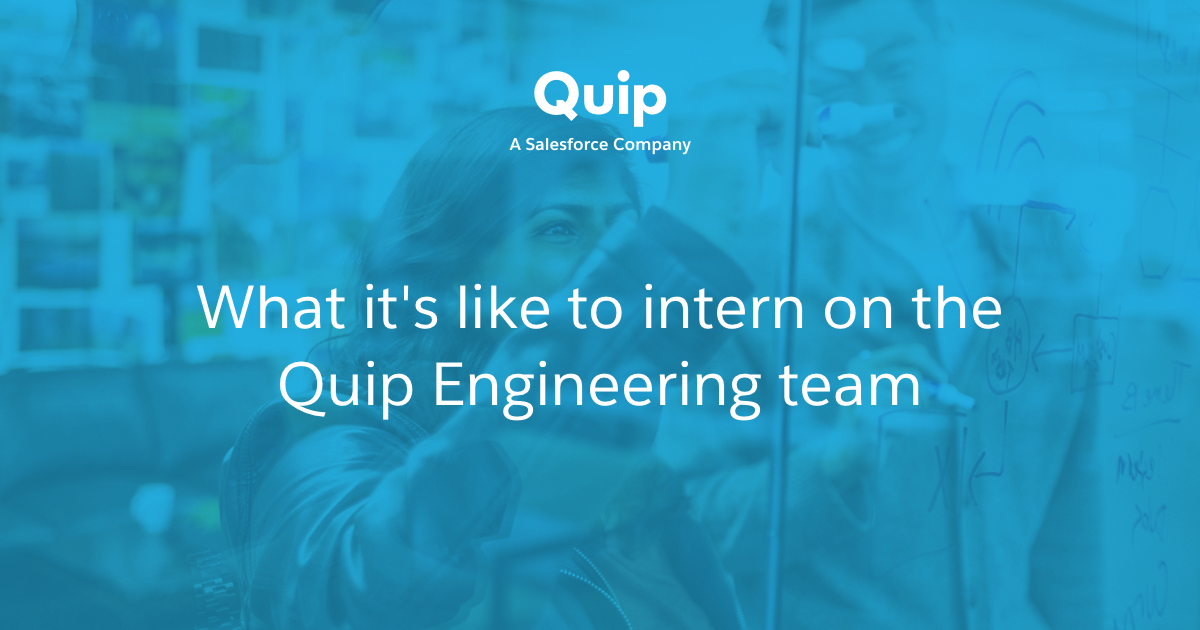At Quip, interns ship

One of my goals for my summer internship at Quip was to be held accountable and have responsibilities at the level of a regular full-time employee. While every company boasts that their interns get to work on impactful projects, in my past experiences interns are still spoiled — showered with piles of swag and expected to work normal hours regardless of the intense hours full-time employees work (fortunately at Quip the norm is for everyone to work regular hours). But I didn't want to be spoiled. I wanted to challenge myself and not settle into complacency.
Internships at Quip are different
Typically, an intern will work on a project, get occasional feedback from a mentor or manager, then (hopefully) ship their project at the end of the internship and dump their work from the summer into the codebase.
But as an intern at Quip, I wasn't waiting until the end of my internship to push a summer's worth of work. I was committing to master every day, often multiple times a day. We have a post-commit review process, which is an unusual experience for most full-time engineers, let alone an intern. My first commit to master was terrifying, but the value in committing frequently and producing a tight feedback loop is unmatched. I could get feedback on my code quickly, then incorporate it directly into the next commit — practicing my engineering skills in a very iterative way.
"My first commit to master was terrifying, but the value in committing frequently and producing a tight feedback loop is unmatched."
Another big difference was my involvement throughout the process of designing, building, and launching a feature. At many companies, an intern's project is launched right before the intern leaves — any changes based on customer or internal feedback are processed and implemented by someone else. At Quip, though, I was fully involved in that process.
What I worked on
My main project was transforming Quip's @mentions into a more flexible feature. When you @mention a person, that mention can now be modified to show any part of the person's name: first, last, full name, or any combination thereof. This is important because people are integral to Quip's vision of placing communication at the core of a collaboration platform. We should be able to “mention” people the same way we'd say their name in a conversation or a meeting.
After working on this for a month, I launched the first version of flexible mentions internally to other Quip employees. And since @mentions are used nearly constantly, a lot of people had opinions. I worked with a PM, my mentor, and even our founders to refine the exact behavior of these mentions — details really do matter!
This process of iterating on feedback continued while I started working on additional projects. One of my friends who recently graduated and has been working in tech for a year told me that the biggest difference between her internships and her experience working full-time was that, as an intern, she had one project and thus one focus. In contrast, as a full-time engineer, she often has to juggle multiple tasks. For my internship, I got a taste of exactly that. While I iterated on feedback for flexible mentions, I started working on other parts of the Quip codebase: the mobile apps, document loading, and even a huge upcoming feature launch for Quip.
An environment for growth and challenge
Because Quip is still small, I didn't just have the opportunity to interact with senior engineers — my project required it. Flexible mentions touched many parts of the codebase, including the editor, mobile apps, React code, and the server. The decisions behind some of this code were nuanced enough that I had to direct questions to the one or two people that either wrote the code or knew it very intimately. This meant interacting with very senior engineers and getting the opportunity to have them review my code: something that I have not experienced elsewhere.
What amazed me even more though is that everyone (from new hires to our most senior employees) is constantly looking to learn and grow. This creates a very constructive environment: a culture of regularly seeking out new ways that can help our product, our engineering, and our growth as individuals.
Now that my internship is coming to an end, it's incredible that my initial goal of “being treated like a full-time new hire” was fulfilled beyond my expectations — but it turns out that it is not the most valuable aspect of my internship. When people ask "what was the best part of your internship," a common answer is "the people." This answer bugs me, because it's extremely vague and implies that kind-hearted people are hard to come by. I've been fortunate to have worked with many kind and smart people in the past. What really made my Quip internship stand out was that, yes, everyone here is amazing, but there is so much value placed onto our own growth as engineers and as people.
